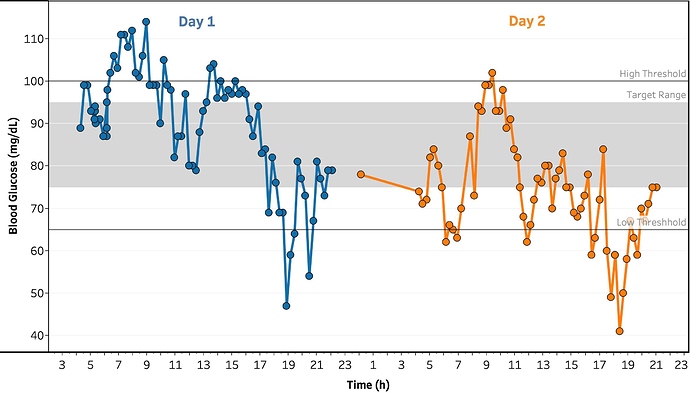Tl;dr (full details here): I have Type 2 diabetes and spent 2 days last week testing my blood sugar every 15 min. I learned a ton that I didn’t know from my normal testing regimen, including that I was hypoglycemic more often and more severely than I realized.
I posted the methods, all data, and my analysis here.
Details & Questions:
Normally, I only check my blood sugar at key times (waking, going to bed, before injecting insulin, before eating, and 1 & 2h after eating). To see if there was anything to be learned from what’s happening the rest of the time, I decided to spend 2 days checking my blood sugar every 15 minutes.
Since I have Type 2 diabetes, my insurance won’t cover a continuous glucose monitor (CGM). Plus, blood glucose meters (BGM) are more accurate, even according to CGM manufacturers. So, for this experiment, I used my Freestyle Freedom Lite and just measured by blood glucose every 15 minutes.
This ended up being way more useful than I expected. There was a lot more going on between the times I usually measure than I realized. Here’s a most important things I learned, my new questions, and ideas for next experiments:
Key Learnings:
- Shorter testing intervals around key times is extremely informative. My normal routine of testing blood sugar before and 1 & 2h post-meals is not sufficient. There’s a lot going happening on both shorter and longer time-scales that will be useful for understanding the effects of different interventions and for optimizing medication.
- I’m spending far more hypoglycemic than I had realized, most notably when I exercise.
- My peaks in blood sugar from breakfast and lunch occur >3h post-meal and persist until my next insulin dose. This is way longer than I expected and indicates that I need to switch to a longer acting insulin or change something about the meals.
- My blood sugar drops significantly during cardio exercise (MMA, biking), then returns to normal over 30-45 min. I need to find a way to mitigate this to prevent my blood sugar from going dangerously low.
Questions:
- What is happening to my blood sugar between waking and breakfast? Any risk of hypoglycemia while driving to work?
- Is the long-duration peak in blood sugar after breakfast and lunch real & consistent? If so, what causes it and can it either be shortened by modifying the meal or mitigated using a longer-acting insulin?
- What is the effect of different types of exercise? How can I mitigate or offset the initial drop in blood sugar during cardio without causing high blood sugar after the recovery?
- What is the effect of dinner, disentangled from exercise?
Next Experiments:
I’m always interested in ideas for new experiments, so please leave a comment if there’s something you’d like me to try.
- Exercise studies: Measure blood glucose at 15 min. intervals for different duration and intensity bike rides and weight lifting. Also try varying time since last insulin dose and food eaten before exercising.
- Long peak from breakfast & lunch: Measure blood glucose at 15 min. intervals a few more times after breakfast & lunch. Try varying protein and fiber content to see if those are the causes. Try normal-acting insulin to mitigate.
- Food & medication studies: It’s proving difficult to disentangle the numerous effects going on at any given meal by adding or subtracting particular foods (data too noisy, too many measurements required to observe a statistically significant effect). Instead:
- Skip meals and medication to measure background trends.
- Consume individual ingredients (glucose, protein, fiber, etc.) or take individual medications to measure their direct effects.
- Measure combinations of ingredients and medications to measure interaction effects.
- This will require more experiments, but I think in the end it will require less time & effort to get reliable results.
Morning:
Measured blood glucose concentration vs. time from 4a-12p, with annotations for key events. Reference bands and lines show target range and high/low thresholds.
Afternoon:
Measured blood glucose concentration vs. time from 10a-5p, with annotations for key events. Reference bands and lines show target range and high/low thresholds.
Evening:
Measured blood glucose concentration vs. time from 4-11p, with annotations for key events. Reference bands and lines show target range and high/low thresholds.




